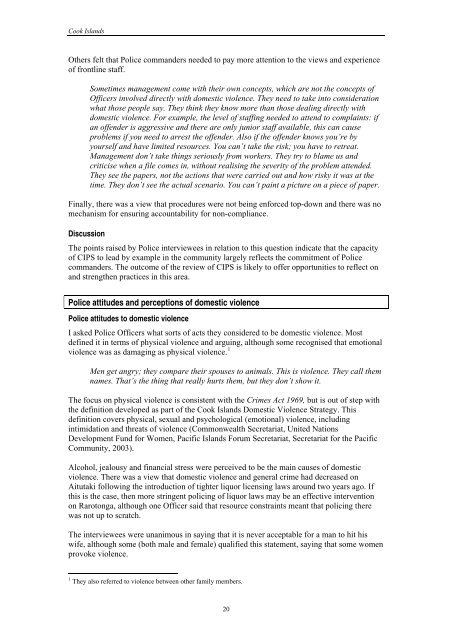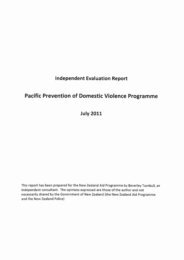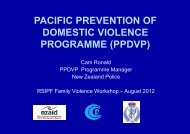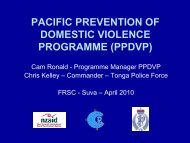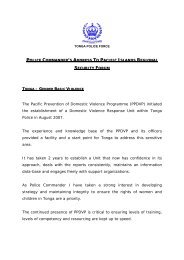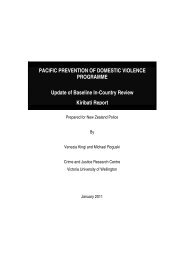Cook Islands - Pacific Prevention of Domestic Violence Programme
Cook Islands - Pacific Prevention of Domestic Violence Programme
Cook Islands - Pacific Prevention of Domestic Violence Programme
Create successful ePaper yourself
Turn your PDF publications into a flip-book with our unique Google optimized e-Paper software.
<strong>Cook</strong> <strong>Islands</strong><br />
Others felt that Police commanders needed to pay more attention to the views and experience<br />
<strong>of</strong> frontline staff.<br />
Sometimes management come with their own concepts, which are not the concepts <strong>of</strong><br />
Officers involved directly with domestic violence. They need to take into consideration<br />
what those people say. They think they know more than those dealing directly with<br />
domestic violence. For example, the level <strong>of</strong> staffing needed to attend to complaints: if<br />
an <strong>of</strong>fender is aggressive and there are only junior staff available, this can cause<br />
problems if you need to arrest the <strong>of</strong>fender. Also if the <strong>of</strong>fender knows you’re by<br />
yourself and have limited resources. You can’t take the risk; you have to retreat.<br />
Management don’t take things seriously from workers. They try to blame us and<br />
criticise when a file comes in, without realising the severity <strong>of</strong> the problem attended.<br />
They see the papers, not the actions that were carried out and how risky it was at the<br />
time. They don’t see the actual scenario. You can’t paint a picture on a piece <strong>of</strong> paper.<br />
Finally, there was a view that procedures were not being enforced top-down and there was no<br />
mechanism for ensuring accountability for non-compliance.<br />
Discussion<br />
The points raised by Police interviewees in relation to this question indicate that the capacity<br />
<strong>of</strong> CIPS to lead by example in the community largely reflects the commitment <strong>of</strong> Police<br />
commanders. The outcome <strong>of</strong> the review <strong>of</strong> CIPS is likely to <strong>of</strong>fer opportunities to reflect on<br />
and strengthen practices in this area.<br />
Police attitudes and perceptions <strong>of</strong> domestic violence<br />
Police attitudes to domestic violence<br />
I asked Police Officers what sorts <strong>of</strong> acts they considered to be domestic violence. Most<br />
defined it in terms <strong>of</strong> physical violence and arguing, although some recognised that emotional<br />
violence was as damaging as physical violence. 1<br />
Men get angry; they compare their spouses to animals. This is violence. They call them<br />
names. That’s the thing that really hurts them, but they don’t show it.<br />
The focus on physical violence is consistent with the Crimes Act 1969, but is out <strong>of</strong> step with<br />
the definition developed as part <strong>of</strong> the <strong>Cook</strong> <strong>Islands</strong> <strong>Domestic</strong> <strong>Violence</strong> Strategy. This<br />
definition covers physical, sexual and psychological (emotional) violence, including<br />
intimidation and threats <strong>of</strong> violence (Commonwealth Secretariat, United Nations<br />
Development Fund for Women, <strong>Pacific</strong> <strong>Islands</strong> Forum Secretariat, Secretariat for the <strong>Pacific</strong><br />
Community, 2003).<br />
Alcohol, jealousy and financial stress were perceived to be the main causes <strong>of</strong> domestic<br />
violence. There was a view that domestic violence and general crime had decreased on<br />
Aitutaki following the introduction <strong>of</strong> tighter liquor licensing laws around two years ago. If<br />
this is the case, then more stringent policing <strong>of</strong> liquor laws may be an effective intervention<br />
on Rarotonga, although one Officer said that resource constraints meant that policing there<br />
was not up to scratch.<br />
The interviewees were unanimous in saying that it is never acceptable for a man to hit his<br />
wife, although some (both male and female) qualified this statement, saying that some women<br />
provoke violence.<br />
1 They also referred to violence between other family members.<br />
20


